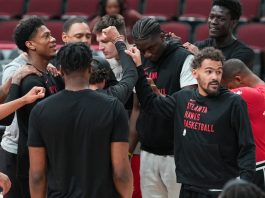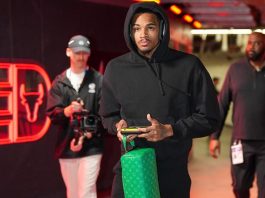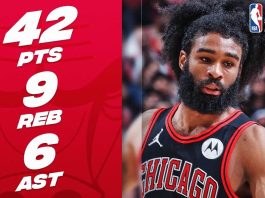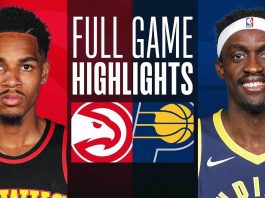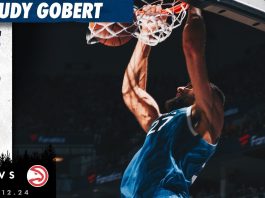Lloyd Pierce was speaking ahead of his online coaching tutorial this Sunday Sept. 13, as part of the Jr. NBA Coaches – Online program, hosted on OWQLO. Subscribe now by downloading the OWQLO App.
Q: Which coaches inspired you before you developed your own coaching style?
LP: I’ve worked for four different head coaches: Brett Brown in Philadelphia, Mike Brown in Cleveland, Keith Smart in Golden State, and then Lionel Hollins in Memphis. All four of those guys have been instrumental in helping me navigate my coaching path in the NBA. Another guy I need to include is Coach [Gregg] Popovich. I had the honour to work with Coach Pop for the USA national team and understanding that a lot of the coaches in the NBA have been influenced and worked under Coach Pop. You tie in Mike Brown and Brett Brown who both worked under Pop. You start to see that a lot of the expertise in the NBA comes from the San Antonio family and is truly linked to what Coach Pop has done. It’s more than the Xs and Os, it’s about the way you can connect with your players, the system you try and create. That’s what I’ve got from all of those coaches.
Q: You played overseas for several years. How did that help you to develop on both a personal and professional level?
LP: The advantage of playing in different countries is learning the culture. Understanding the game is still the same. There’s different ways of emphasising how you play the game but understanding the diversity of our sport and the fact that it’s played in every country and is played at a high level in every country. That allows you to understand different backgrounds and cultural differences.
When I was in Germany, we spent a lot of time getting in shape in that first month or two. They really pressed on us the importance of physiotherapy, conditioning, fundamentals, as well as understanding how much time was spent in a practice session working on shooting. I really appreciated learning that because in our league it’s not something you practice as much in the NBA. You get to see clear differences in how each country approaches the game. We play a lot of games in the NBA and you don’t play the same number of games in Europe so there is more time and opportunity to practise so you can work on shooting and fine tune your skills.
Q: What do you think is the most important quality a head coach can possess? What advice would you give young, up and coming coaches?
LP: the most important quality is your ability to lead – it takes on a lot of characteristics. Leadership comes in the form of setting the example. You need to be prepared for every meeting, for every game, for every practice that’s one form of leadership that I strive to.
The other form of leadership is the ability to inspire your players. You have to get to know your players, you need to know what buttons to push, how to connect with them so you get the best out of your players. If you can maximise what your players do on the court then that’s a form of leadership. You need to learn how to motivate them, how to push them so you get maximum performance from them.
The same applies to your staff as well, if you can delegate and empower your staff and your coaches to really excel in what they focus on whether that’s offensive end, the defensive end or the game-plan management that’s another form of leadership. As a head coach you just have to understand the values of leadership and how to get the most out of your players and staff both on and off the court.
Q: What are the pros and cons of coaching one of the most electric young players in the NBA in Trae Young?
LP: In general it’s not just about our player. In general if you coach in the NBA, you’re coaching some of the best players in the world and I have one of the best players in the world right now, especially in the point guard position who’s just 21 years-old, in Trae Young. The pro is you get to see how talented and how gifted a player like Trae is on a day-to-day basis.
The con is we’re still at the early stages of his development. He’s going to be so much of a better player in three, four, five years – that’s really when all players peak when they’re around 24, 25, 26 years-old and so you go through the growing pains of any young player still learning the level, learning the league, learning the game, learning their body – they’re getting stronger. So we’re still in the early stages of it and so you want that success and all of it to happen right away but you have to go through the growing pains. But to be around that greatness, to be around a high level player at such an early age, he’s averaging 29 [points per game] and 10 [assists per game] in just his second season so to be able to see that at such an early age, you just get excited for what else is coming in terms of his greatness and his ability to grow.
Q: How do you see the game evolving in the next few years and how do centers fit into the future?
LP: For the big men in our league, in our sport, the game has evolved. Three-point shooting has become a key feature in how the offensive game has developed and enhanced itself. Defensively, the ability to switch one through four, one through five and play position-less basketball both offensively and defensively, has been a major emphasis in our sport in the last couple of years but that doesn’t mean that there’s not a role for the big man. You’re seeing a lot of great passing bigs in our league. They’re playing above the floor, up the floor, outside of the 3-point line. We’re seeing bigs that are capable of shooting the three but we’re also seeing bigs who are capable of playing with dribble hand-offs in facilitating roles, whether it’s at the elbow or above the three-point line. But defensively it still remains the same, you’ve got to have an ability to protect the rim, you’ve got to have an ability to defensive rebound at a really high level. And that next phase is do you have an ability to switch and move laterally and keep the ball in front of you, keep the ball from getting to the rim using your length using your quickness, using your intelligence and positioning.
Q: With the draft coming up, what kind of players are you looking for right now that would fit your team?
LP: For us, its players that can come in and contribute right away. We have about 6 or 7 guys, pretty young guys, but guys that are really ready to take that next step. Trae Young and John Collins being our two leaders from a production stand point and all of them are ready to make a really big jump moving in to this third season here in Atlanta.
We add Clint Capela, we’re going to get some more experience in free agency, and then hopefully a young draft pick that can add to the talent level, but maybe show an ability to come in and contribute in some meaningful ways as well. The draft and free agency, when you combine the two and what we’re able to do with our cap space, it’s really can we make the next step, can we make a big jump in terms of including the guys we currently have and adding some pieces that complement and add to that picture as well. That’s going to happen in free agency and in the draft.
Q: You’ve put a lot of time in to Black Lives Matter and social justice and working with the Coaches Association to lead on some of those initiatives. Can you share your views on the players’ recent actions in support of social justice and what is your outlook on the future?
LP: It’s a very passionate and powerful plea by our players and our league as a whole to really stand up for equality. And that’s equality for people of colour, that’s equality for people that have come to our country, that live in our country, to have equal opportunity. That’s what we pride ourselves on here in the United States and we want to make sure we’re doing our part as a league to ensure that all of those things are being met.
We understand there’s a big disparity in a lot of economic and social justices in our country and as a league we’ve committed ourselves and positioned ourselves to not only stand up for but to try and address it so that equality truly is being met and satisfied whether it’s in the NBA, whether it’s in politics, whether it’s in criminal justice, whether it’s with police. Our players have a really huge platform and ability to draw additional attention to it and they can help to find a solution for equality in our country.

